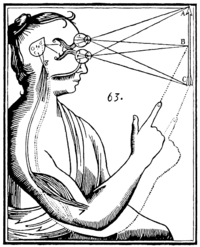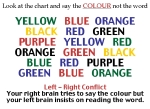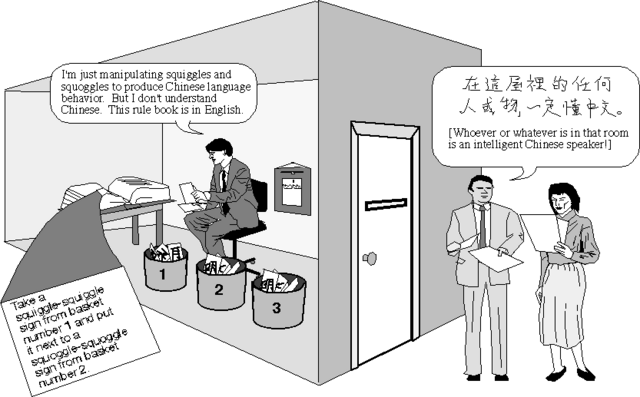Home » Posts tagged 'Chinese Room'
Tag Archives: Chinese Room
The Mind-Body Problem
 For centuries philosophers have been debating over how the mind relates to the body. The two dominant positions on the philosophy of the mind are dualism and materialism. Dualism can be categorized into two types — property dualism and substance dualism — but this essay will focus on substance dualism only. Substance dualism is the belief that persons are comprised of both material and immaterial substances. The opposite view is materialism which states that people are merely material substances or objects and there are no immaterial mental states. Substances are ontological foundations for reality. This essay will defend and explain substance dualism, and will explain some of the problems for materialism.
For centuries philosophers have been debating over how the mind relates to the body. The two dominant positions on the philosophy of the mind are dualism and materialism. Dualism can be categorized into two types — property dualism and substance dualism — but this essay will focus on substance dualism only. Substance dualism is the belief that persons are comprised of both material and immaterial substances. The opposite view is materialism which states that people are merely material substances or objects and there are no immaterial mental states. Substances are ontological foundations for reality. This essay will defend and explain substance dualism, and will explain some of the problems for materialism.
Substance dualism is properly defined as the belief “that the brain is a physical object that has physical properties and the mind or soul is a mental substance that has mental properties” (Moreland 232). Early philosophers have been for the most part dualists. The Greeks believed that the soul would leave the body after death. Christian theologians and philosophers such as Aquinas and Augustine also held this same view. Other early philosophers such as the Gnostics saw matter as inherently and completely evil and the spirit entirely good. Sixteenth century philosopher Rene Descartes was one of the first to actually defend and articulate what dualism is. Descartes used a method of doubt in order to arrive at epistemological conclusions. His first level of doubt involved doubting the senses because of their fallibility. The second level was the possibility of being in a dream world, and the third and final level was on the basis that there could possibly be an evil genius controlling his thoughts and making him have false beliefs. At the end of this method of doubt, Descartes realizes that he can prove that he exists by making the statement “I am, I exist, is necessarily true each time that I pronounce it, or that I mentally conceive of it” (Kolak 46). He made a distinction between his thoughts and his brain. Descartes defined the mental thinking substance as “a thing which thinks” (Kolak 47). The Cartesian concept of dualism would be extremely significant in future definitions of dualism and how the two substances — mental and physical — are defined and explained.
Philosopher Alvin Plantinga defines materialism as “the idea that human beings are material objects—brains, perhaps, or some part of the brain—without immaterial selves or souls.” This would mean that the human is comprised of one substance. This substance is only physical and  material. The mind exists as the brain and is not a different substance. In their work Philosophical Foundations for a Christian Worldview, philosophers J.P. Moreland and William Lane Craig make an observation about materialism. They say that “no material thing presupposes or requires reference to consciousness for it to exist or be characterized” ( Moreland 231). If materialism is true, does that mean consciousness does not really exist? It would appear as such. All mental activities exist in space and time and are based on this material substance.
material. The mind exists as the brain and is not a different substance. In their work Philosophical Foundations for a Christian Worldview, philosophers J.P. Moreland and William Lane Craig make an observation about materialism. They say that “no material thing presupposes or requires reference to consciousness for it to exist or be characterized” ( Moreland 231). If materialism is true, does that mean consciousness does not really exist? It would appear as such. All mental activities exist in space and time and are based on this material substance.
There are several arguments supporting substance dualism and there are also several objections against it. The first of the arguments supporting dualism deals with awareness of the self. Persons have this awareness that they are not necessarily their body. They can introspectively realize that they have both physical and mental substances (Moreland 238). The second argument deals with first-person perspectives. People always have an awareness of themselves before anything else. All experiences a person feels come in the form of a first-person perspective. Materialism, on the other hand, says that all things can be described from a third-person point of view. However, this objection is almost impossible to defend since it is highly unlikely for one to describe the subjective moods and feelings completely of a person from a third-person statement (Moreland 239). The third argument to support dualism is that we have an unchanging personal identity. The body and the mind are constantly being changed but the person still realizes that he or she is the same person (Moreland 239). The final argument is regarding free-will. Dualism makes the best sense of free-will. We have an immaterial substance that is not subjugated under physical laws of nature. Thus our actions are not determined in any sort of way and we can make decisions freely. Free-will also helps in the area of ethics. If persons are determined to do whatever actions they do, then it is hard to make sense of any moral or ethical accountability.
Dualism has a few objections which will be discussed here. The first, and probably the strongest is called the problem of interaction. The problem with dualism is the fact that no one knows how the mind and body interact. Garrett Thomson, professor of philosophy at Wooster College, says “first, we can never have direct experience of this interaction. Second, the two types of substance, mind and matter, are utterly different in kind, and this makes interaction between them obscure, placing some doubt on the whole idea of dualism” (47). J.P. Moreland responds to this claim basically by saying that we do not need to know how the two substances interact. There are many things we know that interact with each other but we do not know exactly how they do. Moreland also says that it might be impossible to answer this question of how the substances interact. He states that by asking how the interaction is fulfilled, one is asking for some cause in-between the two substances. But the interaction between the two might just be a direct interaction and thus this problem of interaction is defeated (243-244). The second objection against dualism deals with Ockham’s razor. Ockham’s razor says that the simplest explanation is generally the best explanation. Dualism is positing two substances rather than one and thus is less likely to be true. The dualist is not multiplying entities beyond what is necessary because they are using it to explain things which materialism cannot. Ockham’s razor is merely just a general rule to find truth in causes and is meant to limit causes to only the amount necessary. But this seems irrelevant for the person who accepts dualism because dualism is not creating unnecessary causes (Moreland 244-245). The last objection is the problem of other minds. If dualism is true, then one cannot actually know if other minds exist because they are immaterial (Thomson 48-49). One could be taken to the conclusion that solipsism — the belief that there is only one mind in reality — is true.
Materialism has some arguments supporting it and many arguments against it. The main one is based off of scientific naturalism. If scientific naturalism is true then there is nothing immaterial and only matter exists. This would support the view that materialism is true. But this is just a presupposition that scientific naturalism is true. John Searle recognizes this by saying that the “acceptance of the current [physicalist] views is motivated not so much by an independent conviction of their truth as by a terror of what are apparently the only alternatives.” Searle goes on by saying dualism is regarded as “unscientific” (Moreland 249). The second argument for materialism is based off Ockham’s razor, but that has already been addressed in this essay. The third argument has to do with the concept of split brains. The brain is divided into two hemispheres. These two parts to the brain are so different from one another yet they interact with each other. “The split-brain patient seems to have two  minds. What the left brain learns and thinks is unknown to the right brain, and vice versa” (Split-Brain). This seems to support the belief that all humans are mere brains. When the brain is split the two hemispheres can work completely independent of each other. In some patients the left hand does things completely contrary to what the right hand is doing (Split-Brain). This would possibly entail that our brains are who we actually are. We cannot use our mental substance to control each side of the brain. Maybe the mental substance is oddly dependent on the physical substance and vice versa.
minds. What the left brain learns and thinks is unknown to the right brain, and vice versa” (Split-Brain). This seems to support the belief that all humans are mere brains. When the brain is split the two hemispheres can work completely independent of each other. In some patients the left hand does things completely contrary to what the right hand is doing (Split-Brain). This would possibly entail that our brains are who we actually are. We cannot use our mental substance to control each side of the brain. Maybe the mental substance is oddly dependent on the physical substance and vice versa.
There are several objections to materialism. The first of these is the problem of the inverted qualia. This problem deals with how we see color. It is impossible to actually know how one sees red or blue. For a person might see a blue truck as a blue truck yet another person might see it as a red truck (Inverted). If this is possible wouldn’t that defeat materialism? The second objection comes from John Searle’s Chinese room thought experiment. The thought experiment involves a person who is locked in a room and does not know Chinese. He is given a rule book on how to formulate these symbols (the book is in English). The formulation of these symbols is based on their syntax and not on their semantics. Let’s say people outside the room are giving this person more symbols in the form of questions and also another rule book on how to pass these questions back to the people. Eventually, all the responses would come back as if the person knew Chinese when in reality he didn’t. This is an example of how computer programs act. They make completely rational responses yet they have no idea why or how they did it. This shows that there’s something more than just a material substance for the person (Moreland 257-258).
The last objection involves determinism. If materialism states that all humans are physical brains then determinism has to be true. Cause and effect is the fundamental law of nature as far as matter is concerned. But determinism is self-refuting. H.P. Owen states that “determinism is self-stultifying. If my mental processes are totally determined, I am totally determined either to accept or to reject determinism. But if the sole reason for my believing or not believing X is that I am causally determined to believe it I have no ground for holding that my judgment is true or false” (Moreland 241). Determinism seems to be a big hurdle for the person who accepts materialism.
Substance dualism is in every way superior to materialism for a few reasons. It makes the best sense of the subjectivity of things such as color, taste, and first-person experience (which cannot be explained in third-person statements). It also helps with maintaining ethics and free-will. Without free-will it would be hard how anyone would make sense of the world or even their own beliefs. And all moral responsibility would seem to completely dissipate if free-will does not exist. Materialism on the other hand is defeated by its determinism and the Chinese room argument. The arguments against dualism seem to not carry as much weight as the arguments against materialism. Materialism only seems to be the more current popular view because of the presupposition it holds — namely, scientific naturalism. The mind-body problem might not be resolved until scientists and philosophers alike are willing to accept the possibility that scientific naturalism might be false.
Works Cited
“Inverted Qualia.” Stanford Encyclopedia of Philosophy. 28 Mar. 2010 <http://plato.stanford.edu/entries/qualia-inverted/#Qua>.
Kolak, Daniel, and Garrett Thomson. The Longman standard history of philosophy. New York: Pearson/Longman, 2006.
Moreland, James Porter, and William Lane. Craig. Philosophical foundations for a Christian worldview. Downers Grove, Ill: InterVarsity P, 2004.
Plantinga, Alvin. Against Materialism. Ms. University of Notre Dame. Http://www.brianauten.com. 27 Mar. 2010 <http://www.brianauten.com/Apologetics/plantinga-against-materialism.pdf>.
“Split- Brain Behavior.” Serendip’s Exchange. 28 Mar. 2010 <http://serendip.brynmawr.edu/bb/neuro/neuro00/web1/Vasiliadis.html>.
Thomson, Garrett. Bacon to Kant: An Introduction to Modern Philosophy. 2nd ed. Long Grove, Illinois: Waveland P, Inc., 2002.

